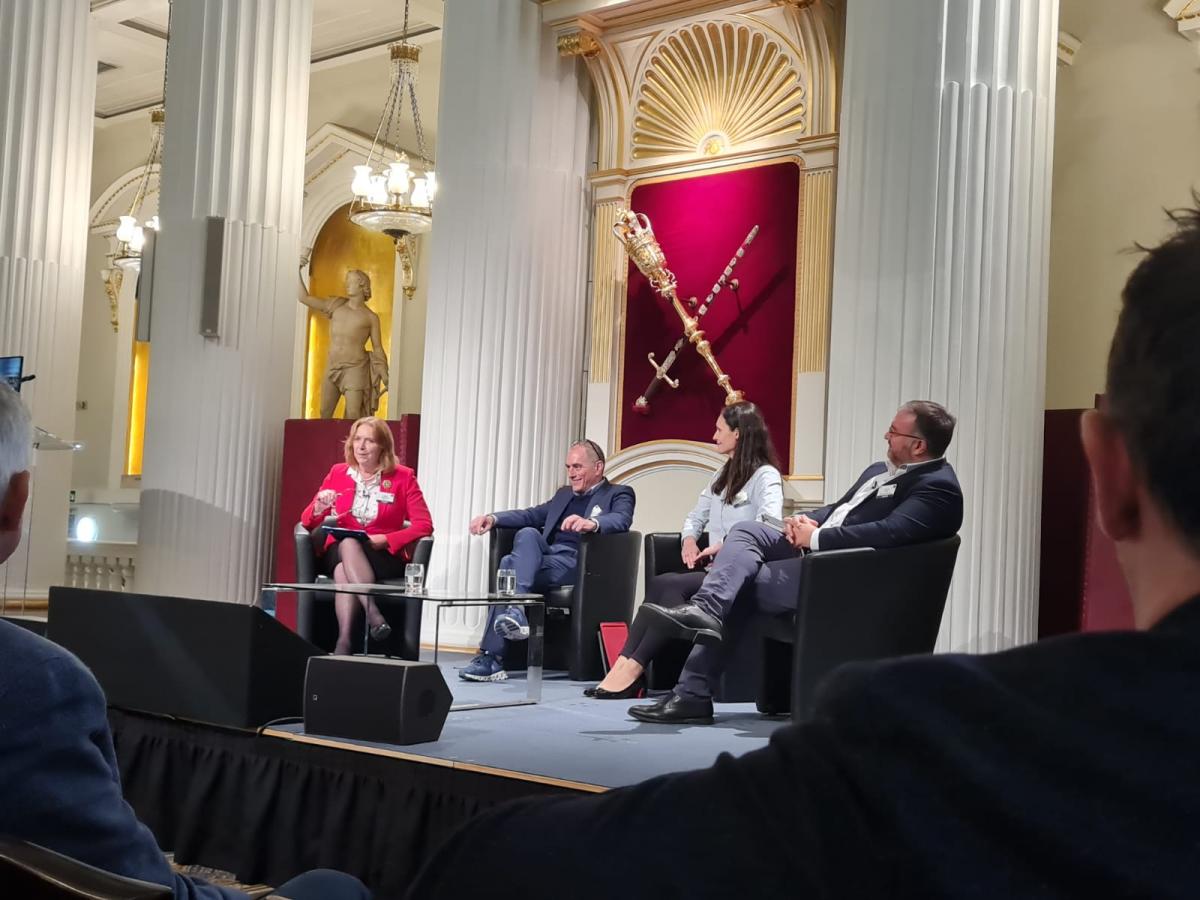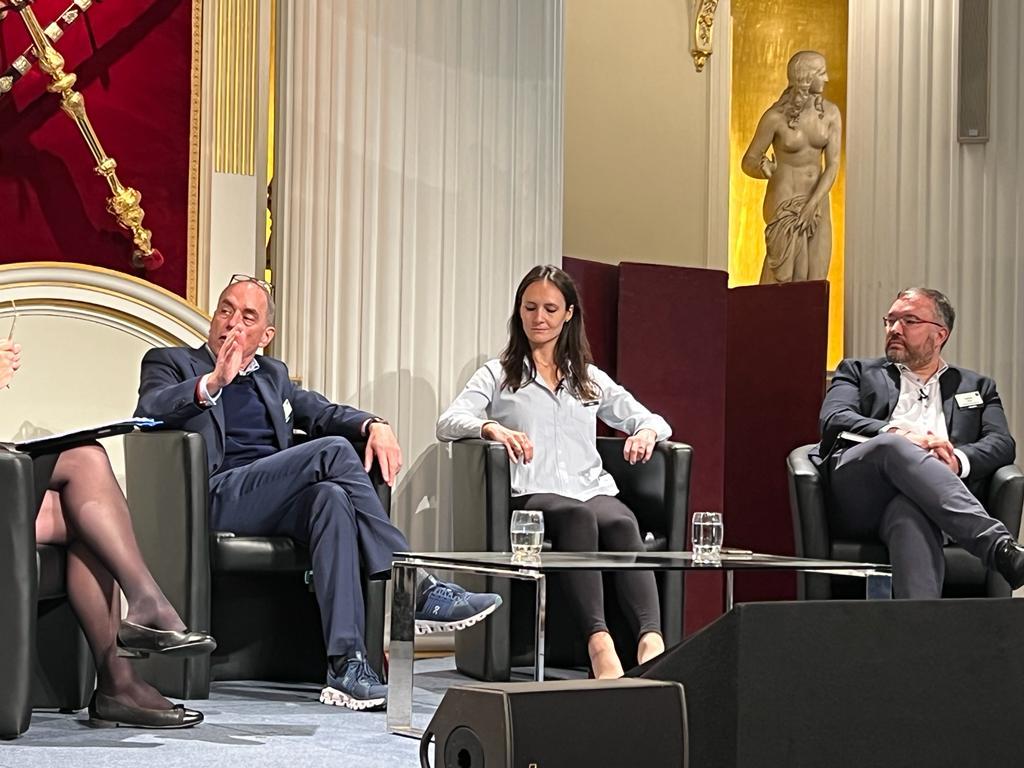Applications
 Part of the Oxford Instruments Group
Part of the Oxford Instruments Group
Expand
Collapse
Earlier this month I was invited to speak on a panel titled ‘Using Quantum for Financial Advantage – NOW!’ at City Quantum Summit’s second annual conference held at Mansion House, the home and office of the Lord Mayor, Vincent Keaveny. The grandeur of the venue and its situation at the heart of London’s financial and political centre, encouraged the audience to listen – an audience made up of some of the industry’s and financial sector’s finest: quantum CEOs, physicists and investors. I was honoured to sit alongside Elena Strbac, Global Head of Data Science Innovation at Standard Chartered and Roman Orus, the CSO & Co-Founder of Multiverse. The panel was chaired by the wonderful Angela Knight CBE, Chair of Pool Re. Other speakers included M&G Plc, Bosch, Boeing, Roche and JP Morgan Chase.
Over the course of the afternoon, as the four panels discussed topics ranging from the use cases of quantum to retaining talent in the industry to quantum investment, I noticed that a kind of seriousness and quietness of thought enveloped the room. Having attended City Quantum’s first summit in 2021, this year, there was a marked sense of an evolved understanding of the value proposition which quantum technologies can and will offer. Karina Robinson, CEO of Robinson Hambro, who presented each of the panels, quoted Eric Shinseki in her opening remarks: If you dislike change you are going to like irrelevance even less.

The whole summit spoke to Shinseki’s pithy statement with every speaker and audience member contemplating the same questions: how do we ensure the UK economy is ready to gain access, use, and promote quantum technology when it is commercially available? How do we, as businesses and investors, maintain our relevance? Ultimately, how do we turn the so-called ‘quantum advantage’ to our own advantage? Currently, we stand somewhere between equivalency and supremacy - depending on the application.
It’s becoming clearer by the day that quantum technologies have potential beyond what classical computers can offer. At the same time, quantum computers are extremely noisy, expensive, and in a 100 qubit computer, we are only speaking to a relatively small percentage of the qubits. So on the one hand, there’s a way to go before we activate the fullest potential of the quantum advantage. On the other hand, to paraphrase my fellow panellist Roman, we shouldn’t wait around for that time before we start exploring the potentiality for quantum to disrupt and transform existing business models. The commercial success of quantum will be driven by its proven applicability, so use cases are the key to unlocking the industry’s future and understanding supremacy. In addition, quantum computing is being used to improve the algorithmic efficiency of classical computers; by seeing from a quantum algorithmic perspective, we can take our newfound knowledge back to the world of classical computers.
As is often the case with emerging technologies, financial services have been quick on the uptake of quantum technology. In financial services, problem-solving has to be quick and answers need to be prompt, which is where quantum’s exponential computing speed-up comes into play. For problems which have exponential complexity as the data set increases, quantum algorithms can optimise portfolios, price derivatives and provide precise answers in real-time with no approximations. Standard Chartered has recently hired a quantum specialist in keeping with their philosophy that quantum computing is not an IT matter, but a business matter, as they get quantum ready for their clients. Trends suggest that quantum algorithms can solve the same problems as classical computers but need far less data to do so. In some cases, quantum computing shows better predictive accuracy than its classical counterpart. Having dedicated resources to quantum in a commercial environment represents a very crucial shift, even from where we were this time last year.
At the other end of the spectrum, quantum can be used in drug development – a notoriously protracted, bureaucratic and expensive process. Not only can quantum optimise supply chains, improve machine learning, and solve problems faster for the global health market which is under increasing pressure, but quantum will have a part to play in the biological, organic processes, too. For example, discovering new molecular compounds for drug candidates and conducting nonclinical studies to test drug efficacy and safety. In cancer treatments, quantum sensing can be used to detect early mutations in tissues and create targeted chemotherapies directed at cancerous cells. Quantum’s shapeshifting quality and its ability to form the enigmatic interface between biological or physical phenomena and human-made concepts, such as supply chain optimisation or cybersecure defences, make it an extraordinarily malleable tool for applications in a range of sectors – evidenced by the diverse roll call of attendees at City Quantum.
City Quantum Summit brings people together in a way that encourages investors to become part of the quantum story, physicists to become part of the commercial story, and businesses to become part of both - as we look to derive business value from applied quantum technologies. Not so very long ago, it was the case that the only way you or I could get access to a quantum computer was through large distributors - eg AWS. Now we have other channels of sales to obtain access, in the form of privately owned data centres, reducing our reliance on the likes of AWS, Microsoft and APS.

We are at the point where banks can own quantum computer access in a data centre in a city. Seeing quantum computers edge closer to the banks themselves, ever closer to the heart of cities, to investment opportunities and to political and financial decision-makers, is absolutely transformational.
In her opening presentation, Karina said that the future of quantum will need three things: communication, collaboration, and immigration. Almost every speaker explicitly or tangentially touched upon the idea that the economy of ideas does not follow geopolitical borders; for quantum to succeed, we need to relax immigration laws to allow like-minded countries to collaborate effectively. It was great to see UKQuantum at the event, as well as QED-C members, who are facilitating these kinds of important conversations between academia, industry and government. And Quantum Exponential, an investment company assembling a diverse and global portfolio of quantum investments. I crossed the threshold of the grand Mansion House feeling hopeful about the future of the quantum industry; I left with a more defined feeling that we are on the precipice of exponential change in commercialising quantum – and that the scientists, quantum companies, investors and a whole host of dynamic businesses in a range of sectors are committed to seeing us across the sticking point. In a few years, we will be able to look back and see how steep this curve of change really was.
*First published by Stuart Woods on LinkedIn
